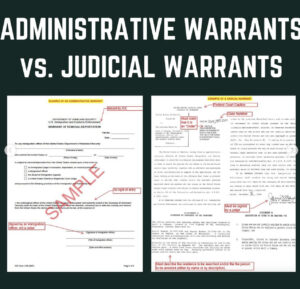The political landscape has shifted, and immigrant communities across the country are feeling the impact. At Hope Immigration, we share your anger and frustration over the new policies that have made undocumented immigrants—and even those with legal status or pending cases—more vulnerable than ever.
Under this new administration, enforcement efforts have escalated rapidly. The resulting chaos, combined with a lack of clear guidance and constant updates and changes, has left many in our community afraid and uncertain about their future. While we understand that this chaos can be a source of panic, know that you are not powerless. You have rights, and knowing them can make all the difference. And this blog will outline them for you.
Your Rights in Private Spaces
Your home should be a place of safety, and the law still protects you from unlawful entry. ICE officers cannot enter your home unless they have a judicial warrant signed by a judge—not an ICE-issued arrest warrant or detainer.

Image credit to the CI View and the National Lawyers Guild of Los Angeles
If agents knock on your door, do not open it. Train your children not to open the door for anyone. Instead, ask ICE to show their warrant through a window or slide it under the door. If they do not have a judicial warrant, you do not have to let them in. If you choose to speak to them, step outside and close the door behind you to prevent them from entering your home under false pretenses.
Private spaces, where ICE generally cannot enter without a judicial warrant, include your home (excluding driveways), schools, places of worship, shelters, and workplaces. However, public spaces such as sidewalks and roads are not protected in the same way. Be aware of your surroundings and exercise caution when traveling or commuting.
In short, in private spaces:
- ICE cannot enter your home without a signed judicial warrant.
- Do not open the door to any strangers.
- Ask ICE to show the warrant through a window or slide it under the door.
- If you choose to speak, step outside and close the door behind.
Your Rights in Public Spaces
Encounters with law enforcement or ICE in public spaces should only occur if officers have reasonable suspicion that you have committed a crime. If approached by an officer, ask if you are free to leave. If they say yes, walk away calmly. If they say no, ask why you are being detained and assert your right to remain silent. You do not have to answer any questions about your immigration status or provide documents that indicate your nationality. However, never show false documents, as this can have severe legal consequences. Carry a Know Your Rights card and present it if necessary to assert your right to remain silent and request legal representation.
In short, in public spaces:
- Encounters should only happen if an officer suspects you committed a crime.
- Ask if you are free to leave.
- You have the right to remain silent.
- Use a Know Your Rights card to assert your rights.
- You can refuse to show documents that indicate your nationality.
- Never show fake documents.
How to Prepare
Now more than ever, preparation is key. Consult with an immigration attorney to see if you qualify for any form of legal protection. Carry important immigration documents, such as your green card or receipts for pending applications, but avoid carrying your passport, as it can be used to determine your nationality. Store all your important documents in a secure place, and make sure someone you trust has access to them.
Create a safety plan for your family. Memorize key emergency contacts and provide your children’s school or daycare with an alternative emergency contact. Consider setting up a power of attorney to handle financial matters and ensure your children’s care in case of detention. Encourage U.S. citizen family members or friends to record any interactions between you and ICE or law enforcement, as documentation can be critical in legal proceedings.
In short, to prepare:
- Consult an attorney for immigration relief options.
- Carry immigration paperwork but avoid carrying your passport.
- Store important documents in a secure place and share access with someone you trust.
- Create a safety plan for your family.
If You Are Detained by ICE
ICE officers are under strict mandates to arrest at least 75 people per day, with a particular focus on those with prior removal orders. Individuals with pending criminal cases are at risk of being detained by ICE before they even get a chance to appear in court.
If you are detained, remain calm and remember your rights. Do not sign any documents without speaking to a lawyer, and do not trust ICE officers who claim that signing will help you return home sooner. You have the right to legal counsel—assert it.
Your family can locate you using ICE’s online detainee locator system by providing your A-number or country and date of birth. In some cases, detainees may be released on their own recognizance or with a bond. Immigration court case information can be found on the Immigration Court website by entering the A-number.
In short, if detained:
- Do not sign anything before consulting with a lawyer.
- Do not trust ICE agents who make claims about signing documents.
- You may be released on your own recognizance or with a bond.
- Your family can locate you using the ICE detainee locator.
- Immigration court information is available online.
Understanding Expedited Removal
Expedited removal is a fast-track deportation process that allows ICE to remove individuals without an immigration hearing. Previously, this applied only to individuals found within 100 miles of the border who had been in the U.S. for less than two weeks. Under the new policy, expedited removal can now apply to anyone anywhere in the U.S. who has been here for less than two years.
To protect yourself, carry documentation proving your length of stay, such as rental agreements, medical records, or school enrollment documents. However, do not present these unless you are at risk of being detained.
Important Things to Remember
Never lie to law enforcement or ICE agents; if they find out you were dishonest, it will only make your immigration situation worse.
The immigration process is slow, and for non-detained individuals, hearings can take years to occur. However, failing to appear for an immigration court hearing will result in an automatic removal order, so staying informed about your case is critical.
While ICE is ramping up enforcement, they cannot detain everyone due to limited space. Ask for legal representation and discuss your options for being released while in proceedings.
If you are arrested for any reason, work closely with a criminal defense attorney to minimize the impact on your immigration status. Be aware that ICE is now arresting people at courthouses before their criminal hearings, making it even more crucial to be prepared and vigilant.
If you have an active immigration case, you may be safe from deportation unless you have a prior removal order. If you do, your case becomes more complicated, and you should seek immediate legal representation.
Resources for Legal Support
We know these times are scary, but you do not have to face them alone. Several resources are available to help protect you and your family:
- Know Your Rights Cards: Download them here, available in 16 languages. Flyers with further information can be found here.
- Know Your Rights 4 Immigrants App: Available in 16 languages, this app alerts your contacts if you are detained, allows you to read out your rights when encountering ICE, can alert you of ICE presence nearby, and more. Download it here.
- Nonprofit Legal Assistance: Find trusted legal help here.
- Pro Bono Immigration Court Lawyers: Locate services here.
- Additional Resources: Admin Relief, AILA, National Immigration Project, and Immigration Advocates.
At Hope Immigration, we stand with our immigrant communities in these difficult times. We will continue to provide updates, resources, and legal assistance to help you stay informed and protected. Follow us on social media, check our weekly blogs, and read our newsletter for real-time updates on new laws and executive orders. If you have questions or need legal guidance, do not hesitate to reach out. We are here to fight for you.


